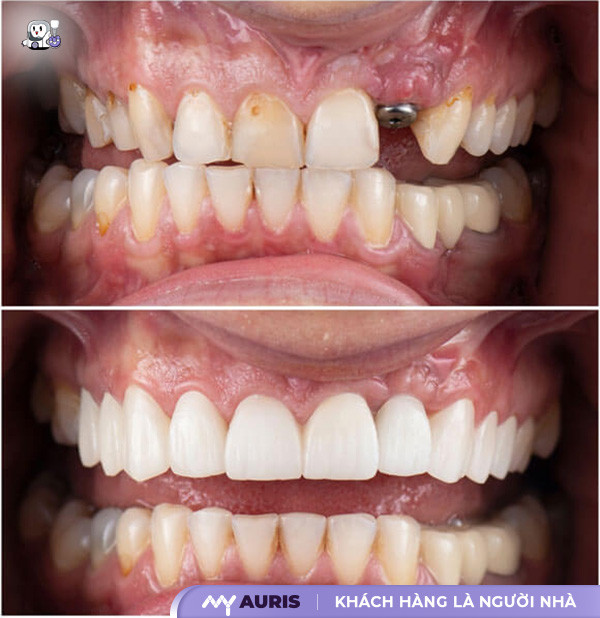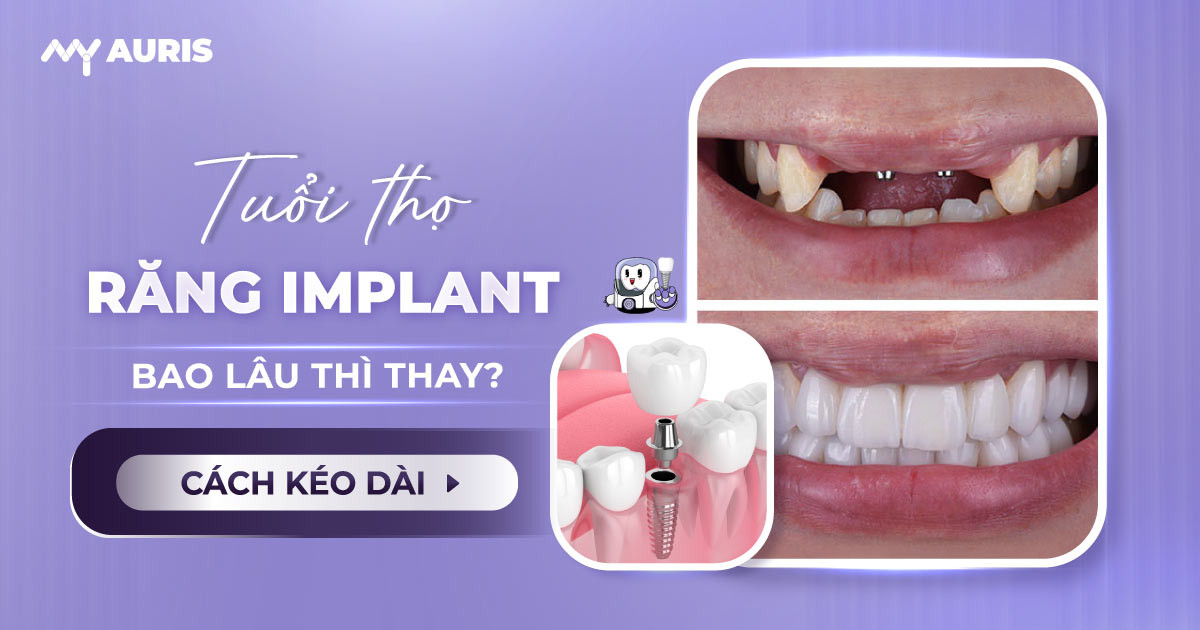Dental implant placement is currently considered the most advanced method for replacing missing teeth, boasting an impressive average lifespan ranging from 25 years to a permanent lifetime if well-maintained. According to M Krebs’ research, the survival rate of dental implants after 17 years reaches 93.3%, confirming their significantly higher durability compared to other methods like dental bridges or removable dentures.
With their ability to integrate securely into the jawbone, implant posts not only restore chewing function but also provide long-term value for the user’s oral health. Adhering to proper care procedures and regular check-ups will help extend the average lifespan of implants, ensuring effective use for decades, or even a lifetime.
How Long Do Dental Implants Last?
Numerous studies in modern dentistry indicate that dental implants last from 25 years, significantly longer than traditional prosthetic methods. Specifically, dental implants are 4 times more durable than porcelain bridges and 8 times more durable than removable dentures, offering superior restoration of missing teeth in terms of both function and aesthetics.
Notably, the longest-lasting implant post in the world has been recorded to last up to 41 years – an impressive figure demonstrating the pinnacle of dental implant technology. With good care, dental implants can be used for a lifetime, allowing users to get their teeth replaced once and avoid the need for replacement as with removable dentures or porcelain bridges.
However, the lifespan of dental implants also depends on each individual’s health and bodily constitution. If you know how to maintain good oral hygiene and care for your teeth properly, using dental implants permanently is entirely feasible. This also explains why more and more people are choosing this method as the most optimal solution for replacing missing teeth today.

Why Are Dental Implants More Durable Than Other Methods?
Compared to other methods like removable dentures or porcelain bridges, dental implants offer superior durability, aesthetics, and long-term chewing ability. The main reason lies in the implant post being directly embedded into the jawbone, creating a strong bond with the bone — something traditional solutions cannot achieve.
Special Dental Implant Structure
The structure of a dental implant consists of three main parts: the implant post, the abutment, and the dental crown. This design mimics the structure of a natural tooth, creating a highly stable artificial tooth system that acts not just as an anchor embedded in the jawbone, but as a cohesive, biocompatible unit with the body.

Titanium Material and Advanced Processing Technology
The implant post material is made from pure Titanium, a super-durable metal that is non-corrosive in the oral environment, non-irritating to the body, and commonly used in medical applications. Thanks to its high biocompatibility, Titanium readily integrates with the jawbone, forming a strong, durable unit that can withstand chewing forces just like natural teeth.
Furthermore, with advanced surface processing technology, integration time is shortened, and bone tissue tightly surrounds the implant post, helping to naturally replace the lost tooth root. The push-pull forces from chewing will help stabilize the implant post, ensuring chewing function almost identical to natural teeth.
Long-lasting and Sustainable Effectiveness
Dental implants address the root cause of tooth loss, whereas removable dentures or dental bridges only replace the crown, failing to prevent jawbone loss. According to research by Dr. Per-Ingvar Brånemark from 1959, Titanium possesses superior biocompatibility with the body, laying the foundation for implant placement as a highly effective method for replacing missing teeth, with a success rate of up to 99%.
Moreover, the implant post is stronger than a natural tooth root because titanium is as hard as steel and does not fracture in the oral environment, thereby maintaining long-term stability and lasting for decades, even over 30 years with good care.
Effectively Preventing Jawbone Resorption
The placement of implants effectively prevents jawbone resorption, a significant advantage over other methods. When firmly integrated with the jawbone, the implant post thoroughly addresses jawbone loss — a condition that commonly occurs with removable dentures or dental bridges, leading to bone degradation and subsequent changes in facial structure over time. Especially for individuals with long-term tooth loss, choosing the right time is crucial — tooth loss should be addressed with early implant placement to maintain stable jaw structure.
Maximum Preservation of Natural Teeth
The greatest advantage of implants is the preservation of natural teeth. Because they are directly implanted into the jawbone, this method does not require grinding down adjacent teeth, as is the case with dental bridges. This preserves the adjacent natural teeth, does not affect surrounding teeth, and maintains the long-term lifespan of the entire dentition.

How to Make Dental Implants Last a Lifetime?
For dental implants to last a lifetime, you need to pay special attention to 4 factors that determine the effectiveness and durability of the implant procedure. These are criteria that experts have identified as crucial for maintaining a safe, highly effective treatment process and ensuring long-term restorative quality.
Choosing a Reputable Implant Dentistry Clinic
The first factor is choosing the right reputable implant dentistry clinic. A reputable clinic must have a clear operating license, a long establishment history, demonstrating reliability and experience in the industry. Such clinics typically boast a team of skilled doctors, modern equipment, and advanced machinery, ensuring quick, precise, and optimally safe treatment for clients.
Performed by an Implant Specialist
To optimize results, you should undergo the implant procedure with an implant specialist – someone with high expertise, a thorough understanding of jawbone structure, and extensive knowledge of implant techniques. An experienced implant dentist will perform the technical steps correctly, helping to minimize pain, greatly reduce post-operative complications, and shorten recovery time.
Prioritizing Genuine, Traceable Implant Posts
Only genuine implant posts should be used, with complete manufacturer information, lot number, barcode, anti-counterfeit stamps, tamper-evident seals, and relevant certifications. This factor ensures quality, integration with the jawbone, and provides greater peace of mind when introducing the implant post into the body, avoiding the risk of rejection or failure later on.
Adhering to Post-Implant Care and Follow-up Instructions
After implant placement, it is crucial to follow the doctor’s instructions and care for your teeth as guided. You need to attend follow-up appointments as scheduled so the doctor can remove sutures, check the integration of the titanium post with the jawbone, and monitor the recovery process. Comprehensive post-implant care instructions and follow-up guidance will help stabilize the implant and maximize its chewing function.
Frequently Asked Questions About Dental Implant Lifespan
Are Dental Implants Durable?
Dental implant placement is considered a highly durable method for restoring missing teeth, with an average lifespan extending from 20 to 40 years, and potentially lasting a lifetime if properly cared for. This is a key advantage that makes implants far superior to porcelain bridges or removable dentures – traditional tooth replacement techniques that typically have much shorter lifespans and lower stability.
How Long Do Tooth Replacements Last?
The lifespan of tooth replacements depends on the method and care regimen. With dental implants, the usage time can range from 25 years to permanent if well-cared for and placed at a reputable dental clinic. In contrast, porcelain bridges can last from 7 to 15 years, while removable dentures only last about 5 – 7 years. Thus, implants offer much longer-lasting effectiveness compared to other methods.
How Long Do Dental Implants Last?
According to statistics from Mischa Krebs’ research, the survival rate of dental implants after 17 years reaches 93.3%. In-depth literature also indicates that the durability of dental implants is 4 times higher than that of porcelain bridges and 8 times higher than removable dentures. Consequently, this is considered a cost-effective, safe, and long-lasting choice for those seeking solutions for missing teeth.
Typically, if the implant surgical procedure is performed by a highly skilled doctor and standard oral hygiene is maintained, dental implants can last from 25 years to a lifetime. However, the lifespan of the implant also depends on various factors, including: the implant site, jawbone quality, the type of implant post used, and the patient’s lifestyle.
Therefore, if you are considering dental implant placement, the most crucial step is to choose a reputable dental clinic that ensures modern equipment and a team of experienced doctors. This is not merely an aesthetic decision, but a worthwhile investment in your long-term health and quality of life.





